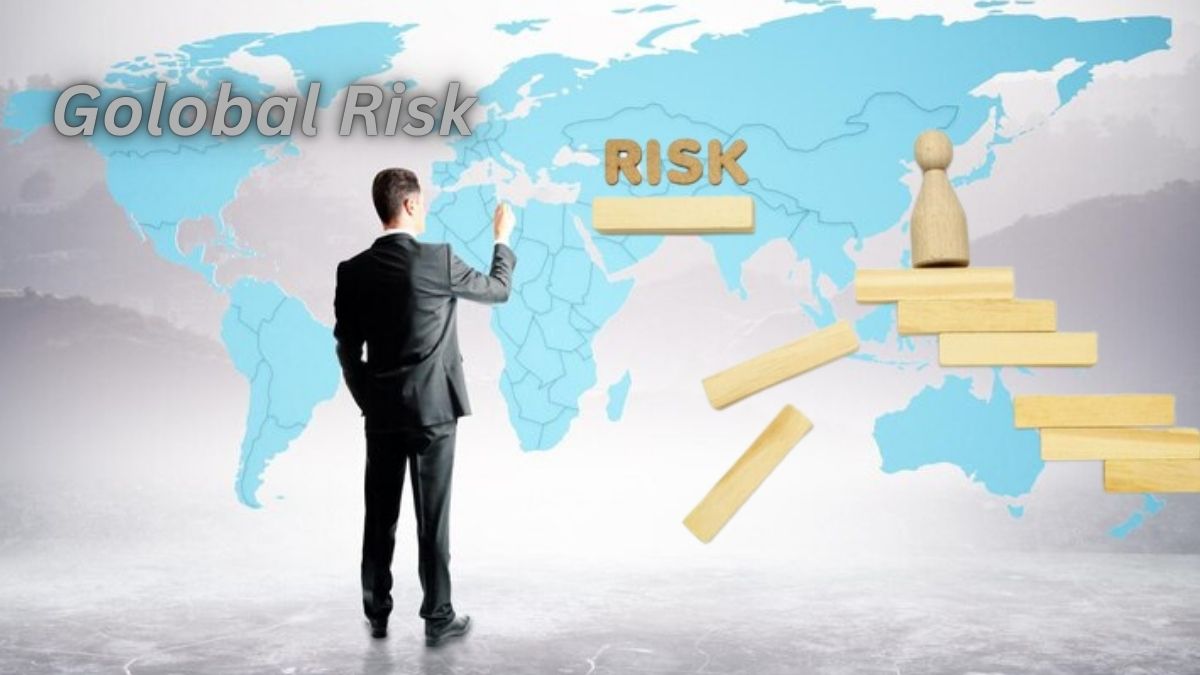As we venture into 2024, the landscape of global risks continues to evolve. The interconnected nature of our world means that challenges in one area can quickly impact others, creating a complex web of risks that affect economies, societies, and the environment. https://finanzasdomesticas.com/principales-riesgos-mundiales-2021/ The year 2024 presents a new set of challenges and opportunities for global stability and growth. From economic fluctuations to environmental concerns, the spectrum of risks demands a nuanced understanding and proactive measures.
Economic Instability: A Looming Threat
Economic instability remains a significant concern for 2024, driven by various factors such as inflation, market volatility, and geopolitical tensions. The ripple effects of these issues can lead to reduced investment, increased unemployment, and lower consumer confidence.
- Inflationary Pressures: Rising costs of goods and services can erode purchasing power and savings, impacting both individuals and businesses.
- Market Volatility: Fluctuations in stock markets can lead to financial uncertainty, affecting investment decisions and economic planning.
- Geopolitical Tensions: Trade wars, sanctions, and political instability can disrupt global supply chains and economic growth.
Climate Change: An Escalating Crisis
Climate change continues to pose an existential threat, with severe implications for ecosystems, human health, and economic stability. The urgency to address this issue has never been greater.
- Extreme Weather Events: Increased frequency and intensity of hurricanes, floods, and droughts disrupt lives and economies.
- Biodiversity Loss: The extinction of species can lead to the collapse of ecosystems, affecting food security and livelihoods.
- Carbon Emissions: High levels of greenhouse gases contribute to global warming, necessitating a shift towards renewable energy sources.
Cybersecurity Threats: Protecting the Digital Frontier
As technology becomes more integrated into our daily lives, cybersecurity threats have escalated, posing risks to personal data, national security, and business operations.
- Data Breaches: Unauthorized access to sensitive information can lead to identity theft, financial loss, and reputational damage.
- Ransomware Attacks: Malicious software that locks users out of their systems until a ransom is paid can cripple businesses and critical infrastructure.
- Cyber Warfare: State-sponsored cyberattacks can disrupt essential services, creating chaos and instability.
Read Also : https://informetecnologia.com/noticias/proximamente-laptop-omen-16-gaming Next-Gen Omen 16 Gaming Laptop
Geopolitical Risks: Navigating a Fragmented World
Geopolitical risks are increasingly complex, driven by power shifts, regional conflicts, and international rivalries. These risks can lead to instability and uncertainty on a global scale.
- Power Shifts: The rise of new economic powers can challenge the existing global order, leading to tensions and conflicts.
- Regional Conflicts: Ongoing conflicts in various parts of the world can spill over into neighboring regions, creating humanitarian crises.
- International Rivalries: Competition between major powers can lead to arms races, trade wars, and diplomatic standoffs.
Public Health Crises: The Importance of Preparedness
The COVID-19 pandemic highlighted the critical need for robust public health systems and preparedness for future pandemics. Ongoing health risks require sustained attention and investment.
- Pandemic Preparedness: Strengthening global health systems to respond to future pandemics is essential to mitigate their impact.
- Vaccine Distribution: Ensuring equitable access to vaccines can prevent the spread of infectious diseases and protect vulnerable populations.
- Mental Health: Addressing the mental health impact of prolonged crises is crucial for societal well-being.
Technological Disruption: Balancing Innovation and Regulation
Technological advancements offer numerous benefits, but they also present risks that need to be managed to ensure sustainable and equitable growth.
- Artificial Intelligence: The rise of AI presents opportunities and challenges, including ethical concerns and job displacement.
- Data Privacy: Protecting individual privacy in an era of big data and surveillance requires stringent regulations and safeguards.
- Digital Divide: Ensuring access to technology and digital literacy is essential to prevent inequalities from widening.
Socioeconomic Inequality: Bridging the Gap
Socioeconomic inequality remains a pressing issue, with significant implications for social cohesion, economic growth, and political stability.
- Income Disparity: Addressing wage gaps and ensuring fair labor practices can promote economic equality and social justice.
- Access to Education: Providing quality education to all individuals is crucial for reducing poverty and enabling upward mobility.
- Healthcare Access: Ensuring access to affordable healthcare can improve overall societal health and productivity.
Environmental Degradation: Preserving Our Planet
Environmental degradation, driven by deforestation, pollution, and unsustainable practices, poses significant risks to ecosystems and human well-being.
- Deforestation: The loss of forests can lead to biodiversity loss, climate change, and disrupted livelihoods for communities.
- Pollution: Air, water, and soil pollution have severe health impacts and degrade natural resources.
- Sustainable Practices: Promoting sustainable agricultural, industrial, and urban practices is essential to preserve the environment.
Global Governance: Strengthening International Cooperation
Effective global governance is crucial for addressing transnational challenges and promoting peace, security, and development.
- Multilateralism: Strengthening international institutions and cooperation can enhance global stability and problem-solving.
- Human Rights: Protecting human rights and promoting justice and equality are fundamental to global peace and security.
- Conflict Resolution: Effective mechanisms for resolving conflicts and disputes can prevent escalations and promote peace.
Energy Security: Ensuring Reliable and Sustainable Supply
Energy security remains a critical concern, with implications for economic stability, national security, and environmental sustainability.
- Renewable Energy: Transitioning to renewable energy sources can reduce dependence on fossil fuels and mitigate climate change.
- Energy Infrastructure: Investing in resilient and efficient energy infrastructure is essential for ensuring reliable supply.
- Energy Equity: Ensuring access to affordable energy for all populations can promote economic development and social equity.
Food Security: Feeding a Growing Population
Food security is a fundamental challenge, with rising populations and environmental pressures necessitating innovative solutions.
- Sustainable Agriculture: Promoting sustainable farming practices can enhance food production while preserving the environment.
- Food Distribution: Improving food distribution systems can reduce waste and ensure equitable access to nutritious food.
- Climate Resilience: Enhancing the resilience of agricultural systems to climate change is crucial for food security.
Urbanization: Managing Rapid Growth
Urbanization presents both opportunities and challenges, requiring careful planning and management to ensure sustainable and livable cities.
- Infrastructure Development: Investing in infrastructure can support economic growth and improve quality of life in urban areas.
- Affordable Housing: Providing affordable housing is essential to accommodate growing urban populations and reduce inequalities.
- Sustainable Urban Planning: Promoting sustainable urban development can reduce environmental impact and enhance resilience.
Resource Scarcity: Addressing Critical Shortages
Resource scarcity, driven by population growth and environmental pressures, poses significant risks to global stability and development.
- Water Security: Ensuring access to clean water is essential for health, agriculture, and industry.
- Mineral Resources: Managing the extraction and use of mineral resources is crucial for economic development and environmental sustainability.
- Land Use: Promoting efficient and sustainable land use practices can mitigate the impact of resource scarcity.
Human Migration: Navigating Complex Dynamics
Human migration, driven by conflict, economic opportunity, and environmental pressures, presents complex challenges and opportunities.
- Refugee Crisis: Addressing the needs of refugees and displaced persons is essential for humanitarian and security reasons.
- Labor Migration: Managing labor migration can promote economic growth and development while protecting migrant rights.
- Integration: Promoting the integration of migrants into host communities can enhance social cohesion and economic benefits.
Technological Innovation: Harnessing Potential
Technological innovation offers immense potential for addressing global challenges, but it requires careful management and regulation.
- Healthcare Technology: Advancements in healthcare technology can improve health outcomes and reduce costs.
- Environmental Technology: Innovations in environmental technology can mitigate climate change and promote sustainability.
- Education Technology: Leveraging technology in education can enhance learning outcomes and accessibility.
Demographic Shifts: Adapting to Changing Populations
Demographic shifts, including aging populations and changing birth rates, present significant challenges and opportunities for societies.
- Aging Population: Addressing the needs of an aging population requires investment in healthcare, pensions, and social services.
- Youth Unemployment: Providing opportunities for young people is crucial for economic growth and social stability.
- Population Growth: Managing population growth in a sustainable manner is essential for long-term development.
Global Health: Building Resilient Systems
Global health remains a critical area of focus, with ongoing challenges and emerging threats requiring robust and adaptable systems.
- Infectious Diseases: Strengthening global health systems to prevent and respond to infectious diseases is essential for public health.
- Chronic Diseases: Addressing the rise of chronic diseases requires investment in prevention, treatment, and research.
- Health Equity: Promoting health equity can ensure that all populations have access to quality healthcare.
Economic Inequality: Addressing the Divide
Economic inequality continues to be a major global issue, with significant implications for social stability and economic growth.
- Wealth Distribution: Implementing policies to promote fair wealth distribution can reduce inequalities and promote social justice.
- Labor Rights: Protecting labor rights and promoting fair wages can enhance economic equality and worker well-being.
- Social Safety Nets: Strengthening social safety nets can provide support for vulnerable populations and reduce poverty.
Environmental Conservation: Protecting Natural Resources
Environmental conservation is essential for preserving natural resources and promoting sustainable development.
- Protected Areas: Expanding protected areas can conserve biodiversity and promote ecosystem resilience.
- Sustainable Resource Use: Promoting sustainable resource use practices can mitigate environmental degradation.
- Community Engagement: Engaging communities in conservation efforts can enhance their effectiveness and sustainability.
Artificial Intelligence: Navigating Ethical Challenges
Artificial intelligence presents both opportunities and challenges, requiring careful consideration of ethical and societal implications.
- AI Ethics: Developing ethical guidelines for AI can ensure its responsible and beneficial use.
- Job Displacement: Addressing the impact of AI on employment requires policies to support affected workers and promote job creation.
- AI Regulation: Implementing effective regulation can balance innovation with protection of individual rights and societal values.
Financial Crises: Building Resilient Systems
Financial crises continue to pose significant risks to global stability, necessitating robust systems and policies to prevent and mitigate their impact.
- Banking Regulation: Strengthening banking regulation can enhance financial stability and protect consumers.
- Crisis Management: Developing effective crisis management systems can mitigate the impact of financial crises.
- Economic Diversification: Promoting economic diversification can reduce vulnerability to financial shocks.
Social Unrest: Addressing Root Causes
Social unrest, driven by inequality, injustice, and political instability, poses significant risks to global stability and development.
- Political Stability: Promoting political stability and inclusive governance can reduce the risk of social unrest.
- Social Justice: Addressing issues of social justice and inequality can enhance social cohesion and stability.
- Community Engagement: Engaging communities in decision-making processes can enhance their resilience and prevent unrest.
Sustainable Development: Balancing Growth and Conservation
Sustainable development remains a critical goal, balancing economic growth with environmental conservation and social well-being.
- Green Economy: Promoting a green economy can enhance sustainability and economic resilience.
- Inclusive Development: Ensuring that development benefits all populations can reduce inequalities and promote social justice.
- Climate Resilience: Enhancing climate resilience is essential for sustainable development in the face of environmental challenges.
Conclusion
The year 2024 presents a complex landscape of global risks, requiring coordinated efforts and innovative solutions to address them effectively. https://finanzasdomesticas.com/principales-riesgos-mundiales-2021/ By understanding and addressing these risks, we can promote global stability, sustainability, and well-being. It is crucial to stay informed and engaged, recognizing that our actions today will shape the future of our world.
Read More : Autoflowers 60 Daysor Less To Mature 20thc Or High Thc The Best Autoflowers
FAQs
What are the major global risks for 2024?
- The major global risks for 2024 include economic instability, climate change, cybersecurity threats, geopolitical risks, public health crises, and technological disruption.
How can we address economic instability in 2024?
- Addressing economic instability requires measures such as controlling inflation, stabilizing markets, and mitigating geopolitical tensions.
What are the implications of climate change for 2024?
- Climate change can lead to extreme weather events, biodiversity loss, and increased carbon emissions, impacting ecosystems, human health, and economic stability.
How can we protect against cybersecurity threats in 2024?
- Protecting against cybersecurity threats involves strengthening data security, mitigating ransomware attacks, and addressing state-sponsored cyber warfare.
What are the challenges of geopolitical risks in 2024?
- Geopolitical risks include power shifts, regional conflicts, and international rivalries, which can lead to instability and uncertainty.
How can we prepare for future public health crises?
- Preparing for future public health crises requires strengthening global health systems, ensuring equitable vaccine distribution, and addressing mental health impacts.





